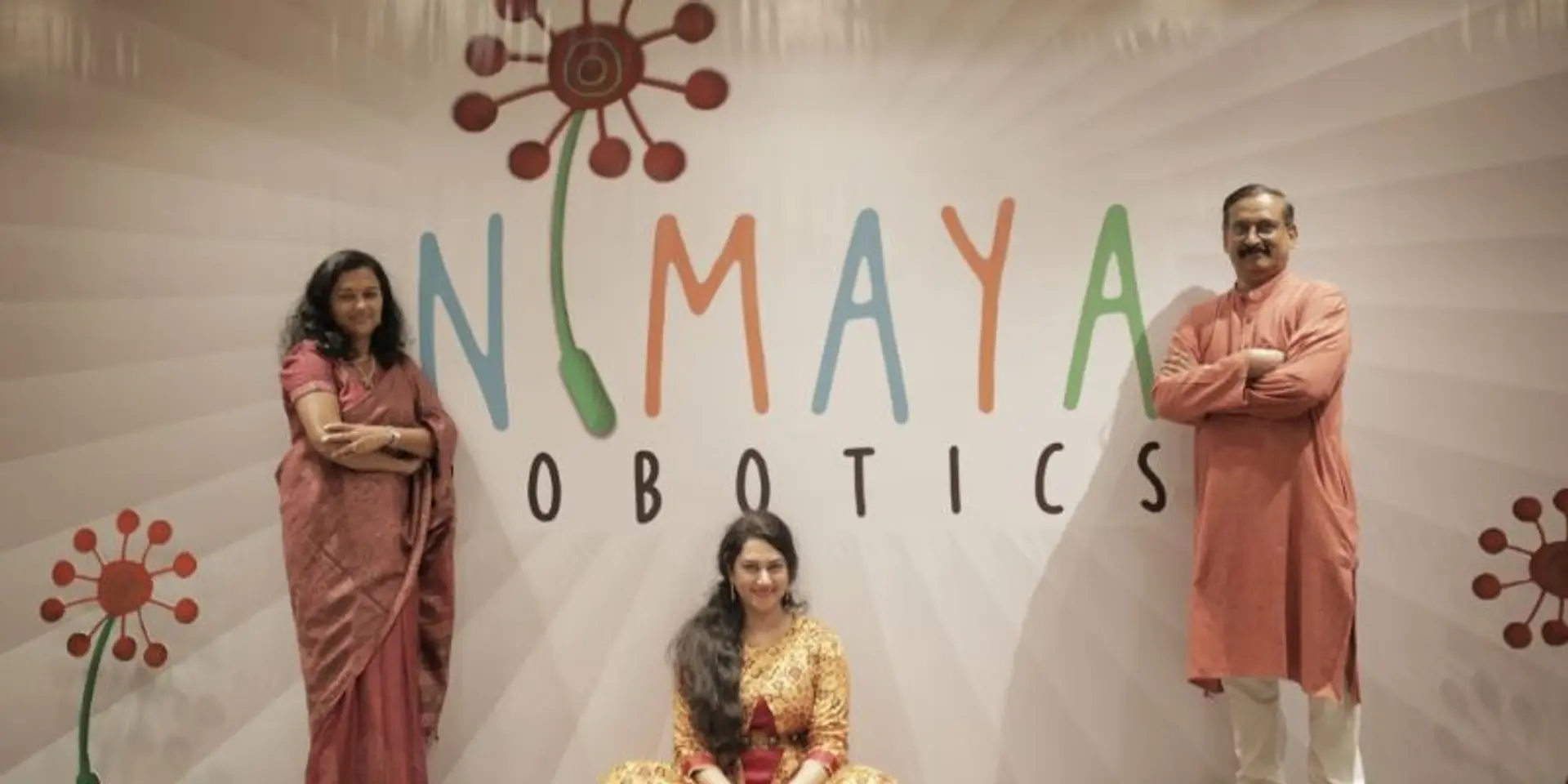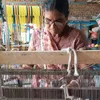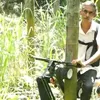This startup is making a difference in the lives of autistic children by using interactive robotics
Founded in September 2018, Nimaya Robotics is using robotics-based therapy to help autistic children perform basic functions and become independent.
One in 500 people in India is diagnosed with autism. This means that around 0.2 percent of the population or 21.6 lakh individuals are affected by the disorder, according to the Rehabilitation Council of India. Autism Spectrum Disorder, or ASD, is visible in the form of a developmental disorder and is curable. In other words, autism is characterised by poor social interaction and unusual or repetitive behaviour.
Addressing this issue among young children is one of the many concerns of the government, for which it has come up with certain policies and provisions through the National Trust for Welfare of Persons with Autism, Cerebral Palsy, Mental Retardation, and Multiple Disabilities. Despite these provisions, much more needs to be done, and that’s where NGOs and individuals are coming forward to make a difference.
With a vision to bring about change in the lives of millions of special children, Nimaya Robotics was founded by Dr Ramya S Moorthy, Subashree Krishnan, and SA Srinivasa Moorthy in September 2018. Nimaya is using robotics-based therapy to help autistic children perform basic functions and become independent. Nimaya has so far conducted field pilots with 60 children across five special education centres in Karnataka and Tamil Nadu.
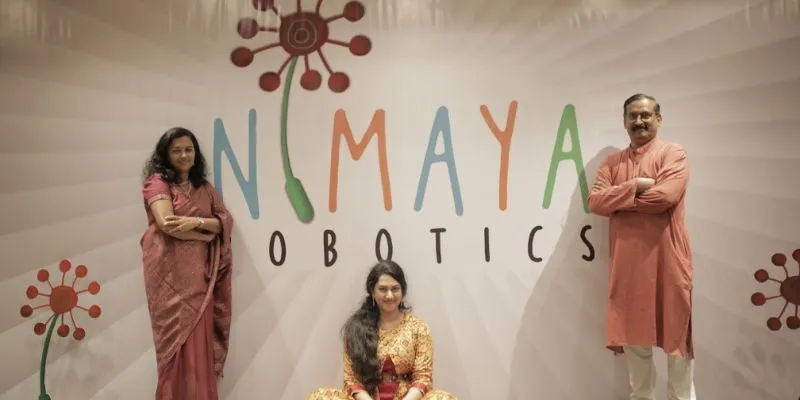
The core team of Nimaya Robotics
The journey
It was during Ramya’s doctoral research in the Application of Social Robotics to Autism Therapy, that was born.
Speaking to SocialStory, Subashree says, “When Ramya was pursuing her MTech with specialisation in robotics, she came across a number of children with ASD. Their struggle to cope with the disorder made a deep impact on her, and she started exploring ways on how robotics as a field could help make a difference.”
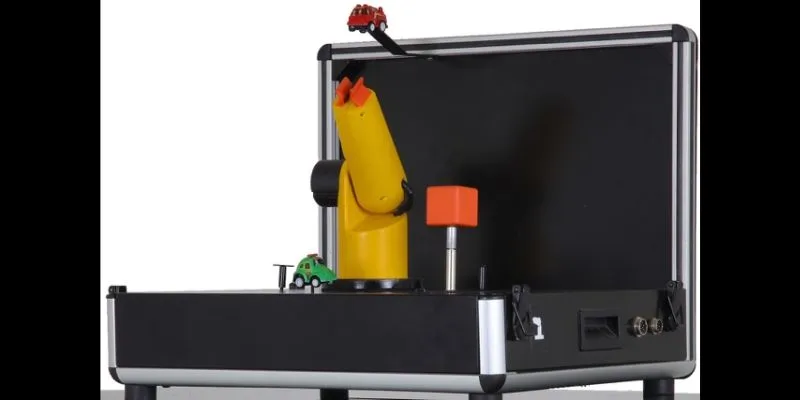
Joystick Skill Training set
These thoughts drove Ramya to pursue her PhD in this area. During her initial research, Ramya identified that there was limited technological innovation in occupational therapy, and decided to dedicate five years of her doctoral research to bring innovation into this field, specifically in the improvement of psychomotor and cognitive skills.
After completing her PhD, Ramya wanted to come out with a product in the market. It was at this time that she got in touch with Subashree and Moorthy, who started contributing with their business and technical skills. These efforts led to the formation of Nimaya Robotics.
The innovative robotics solution
The startup has come up with solutions like Joystick Skill Learning Unit, one of the first devices to be used in training sequence. The playtime involves moving the robotic arm towards the target toys using the joystick, which helps in developing concept of direction, palmar grasp, elbow movement, and hand-eye coordination.
Similarly, the startup has developed other products like Door Skill Training Unit, Shoe Skill Training Unit, Shirt Skill Training Unit, and Trainer Interface Unit, which helps young kids learn daily activities.
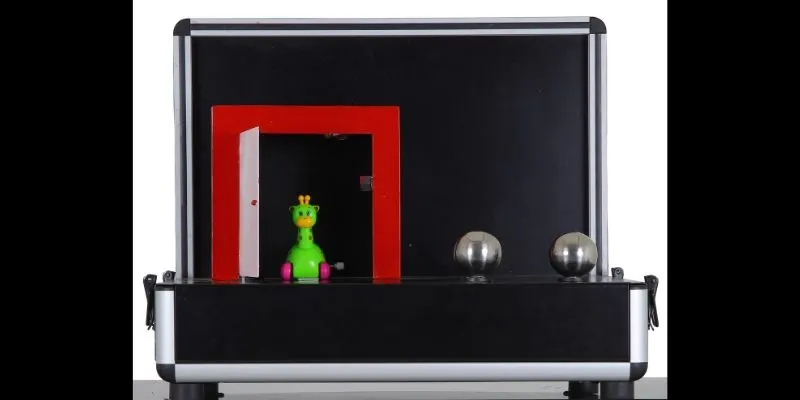
Door Skill Training Unit
According to Subashree, the six pillars of the organisation’s value proposition are active learning, which combines play and learning; make it innovative; gamified to make learning easy; make it effective to develop faster skills; and make it customisable and fun.
To give an insight into the these concepts, its main objective is to make children react in a positive manner and develop love in them, instead of making them think about it as a therapy session.
On the other hand, Nimaya’s active learning is purely based on sound principles. Subashree says, “When the feedback is built into the learning system, the child in incentivised to learn faster and retain it longer.”
Also, Nimaya’s approach and products infuse innovation into the field of occupational therapy and special education. The organisation claims to be the first to introduce robotics-based training in India.
As special children are sensitive to sensory inputs, the products are easily customisable. “Our Skill Training Units are gamified because as children are challenged at different levels, it helps them in making progress. This sustains their interest”, says Subashree.
Nimaya’s products are the outcome of five years of doctoral research in the application of social robotics to autism therapy, followed by two years of research and development. The startup’s pilots have proven that there is a 50 percent acceleration in the acquisition of the skill as compared to conventional methods.
Reaching out to special schools
Children with Autism Spectrum Disorder and multiple disabilities attend Occupational Therapy or Special Education Centres. In India, there are about 1,000 centres, whereas Nimaya Robotics offers Suprayoga, claimed to be India’s first robotics training programme, to these Occupational Therapy or Special Education Centres.
“Our programme is designed in such a way that it augments the current therapy methods,” adds Subashree.
By integrating into existing schools, the startup empowers the schools to offer better services.
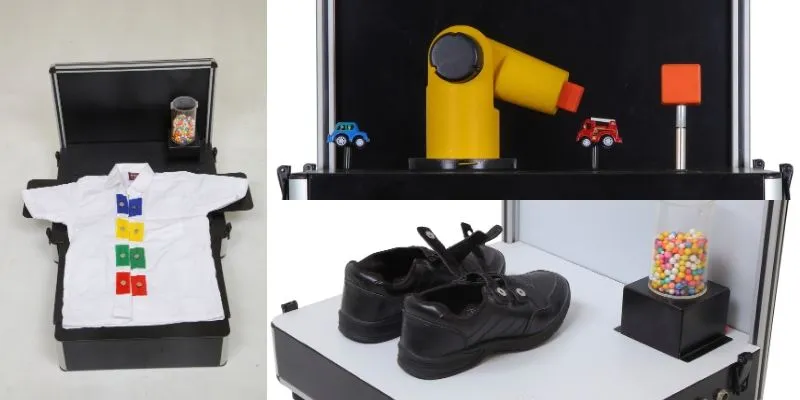
Other products as well
Further, Nimaya has signed an MoU with The National Institute for Empowerment of People with Multiple Disabilities (NIEPMD), Chennai. Through this, it plans to offer training to all the children who come to NIEPMD. Most of these children come from low-income backgrounds.
Narrating an incident, Subashree says, “One boy was stuck in the bathroom and could not let himself out as his mother had gone to the first floor of the house. After training with the Door Skill Training Unit, the mother was happy to report that her son is now independent. He is able to open and close doors, operate shower knobs and grasps water bottles by himself. She is no longer constrained to be always around him inside the house to take care of his basic needs.”
The plan ahead
Subashree says, “We have ideas for several other designs that will help expand the scope of learning rapidly. Nimaya’s mission is to create products that will help special children.”
Thanks to its innovation and solutions, the startup is generating a lot of interest among Special Needs schools in Tamil Nadu and Karnataka. Parents of affected children are also approaching the startup from Mumbai and other parts of India.
“We are proud to be one of the incubates of Enable India, and hope to reach all 800 centres in India and expand globally in the next five to seven years,” says Subashree.
(Edited by Javed Gaihlot)


